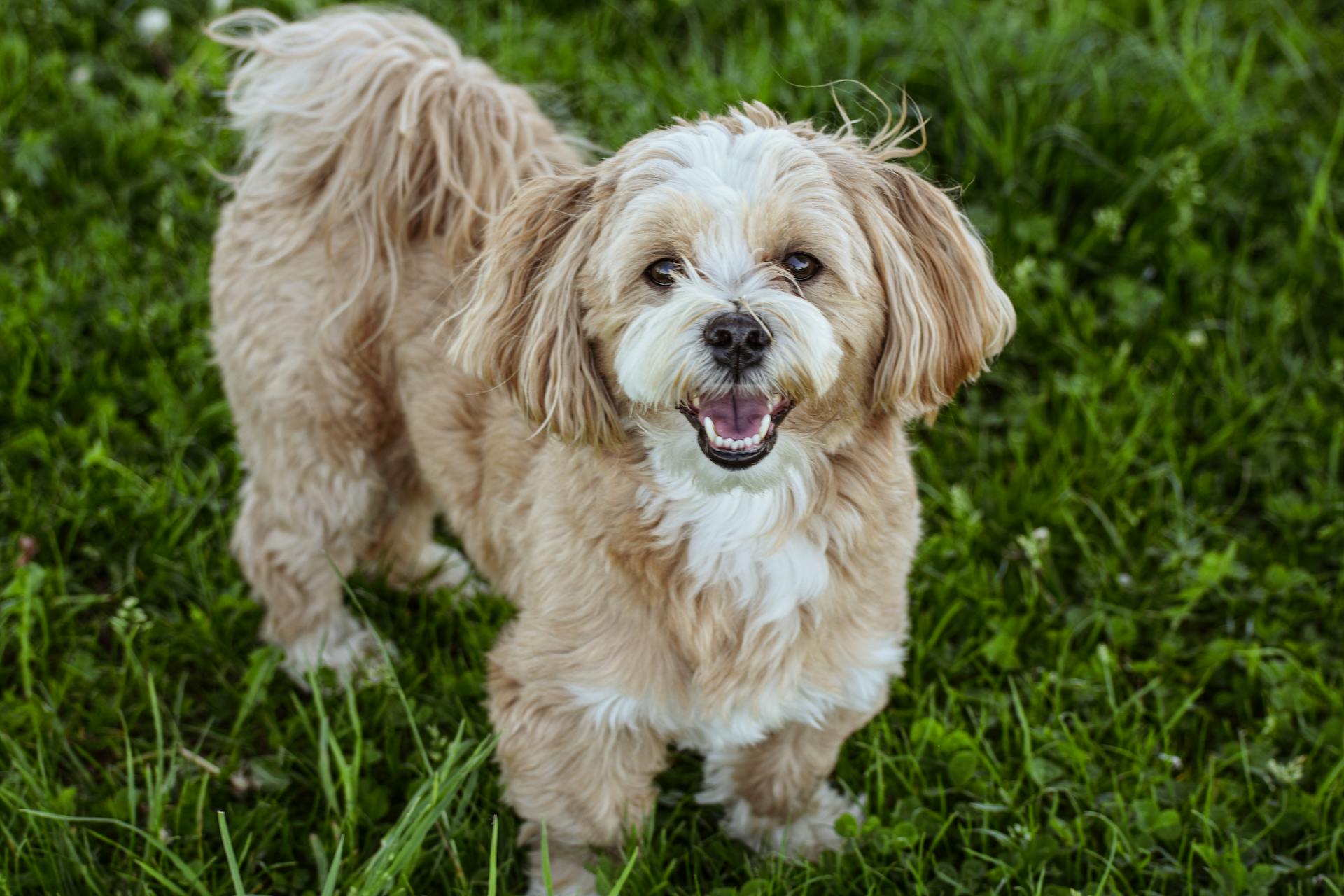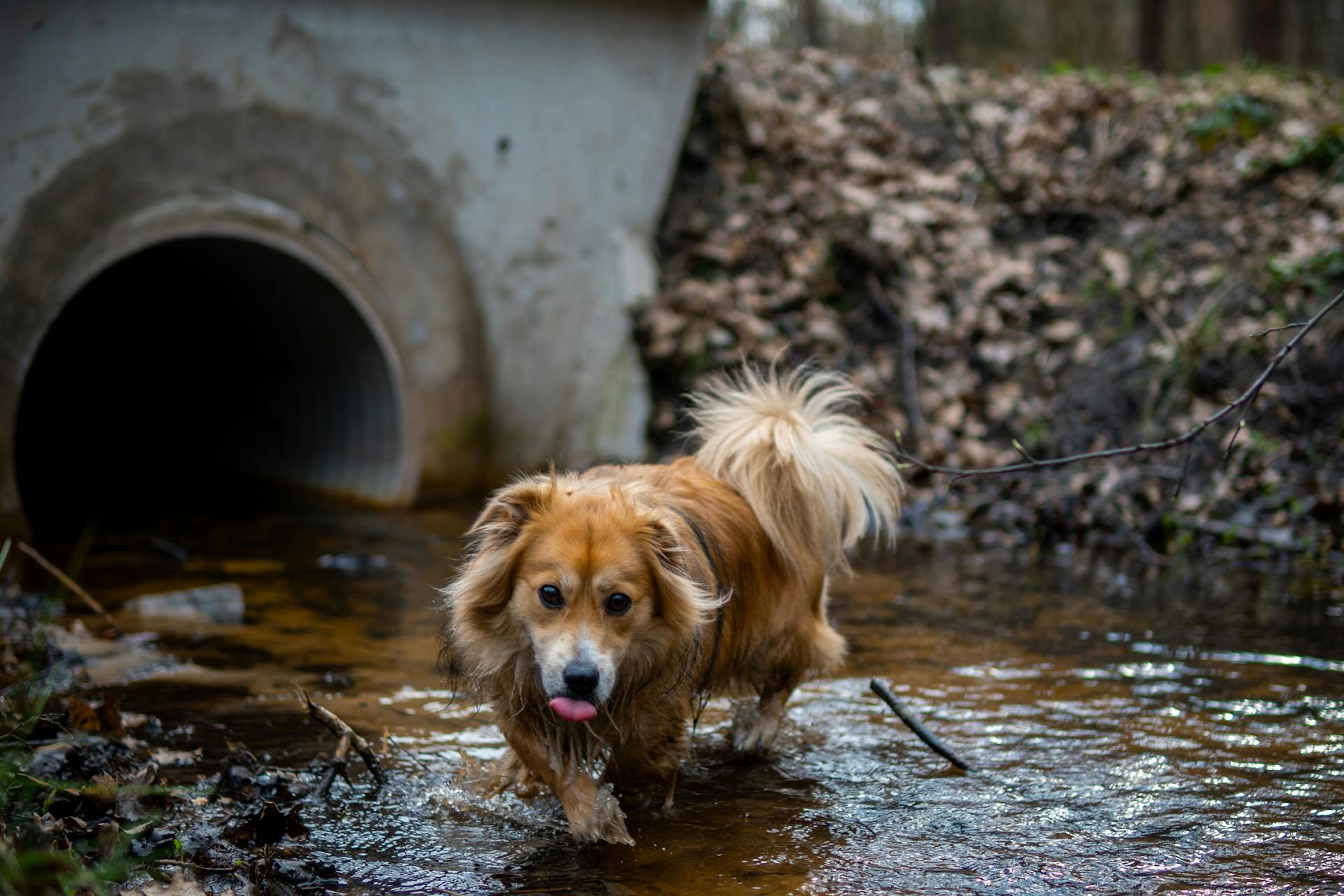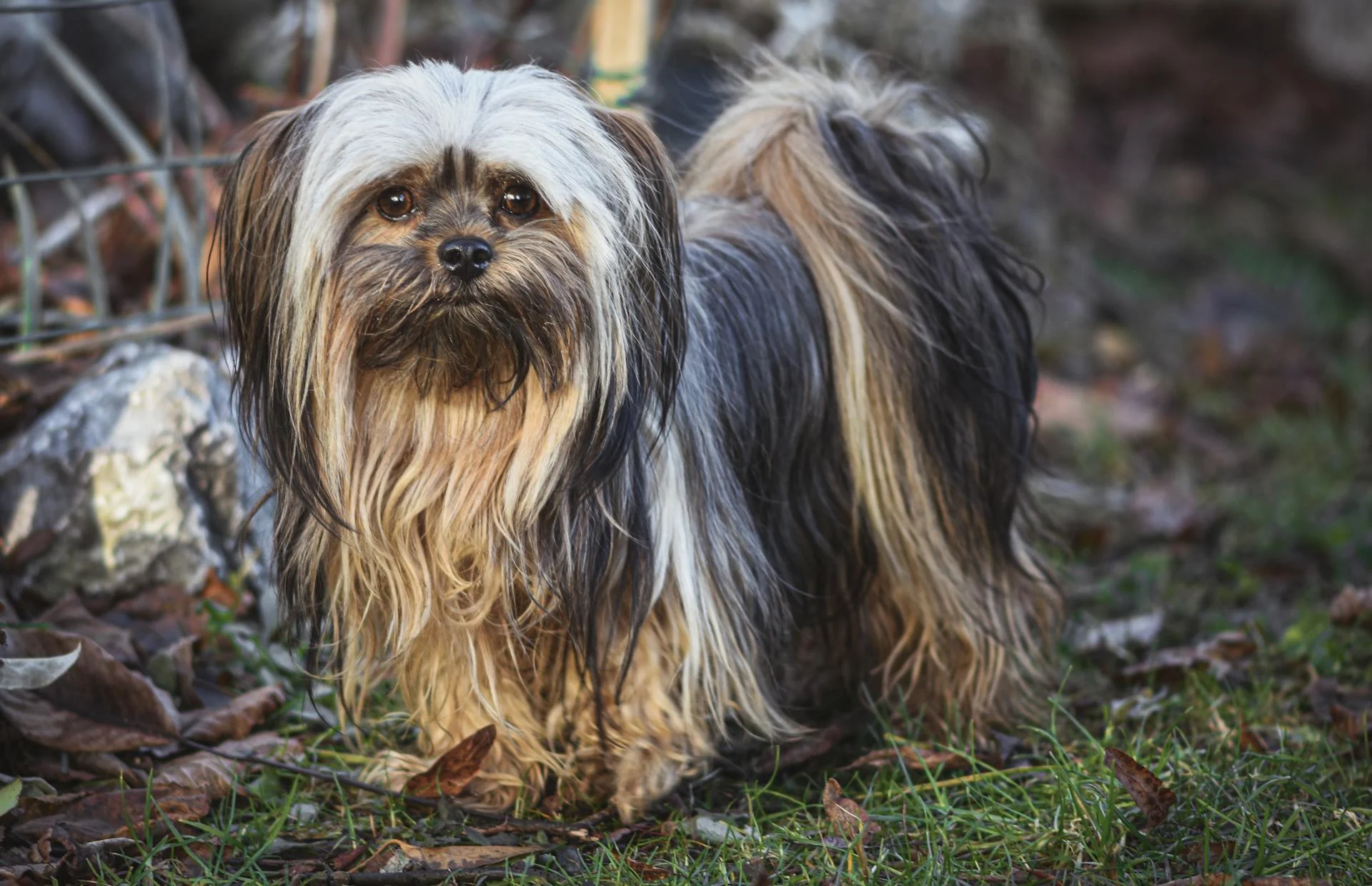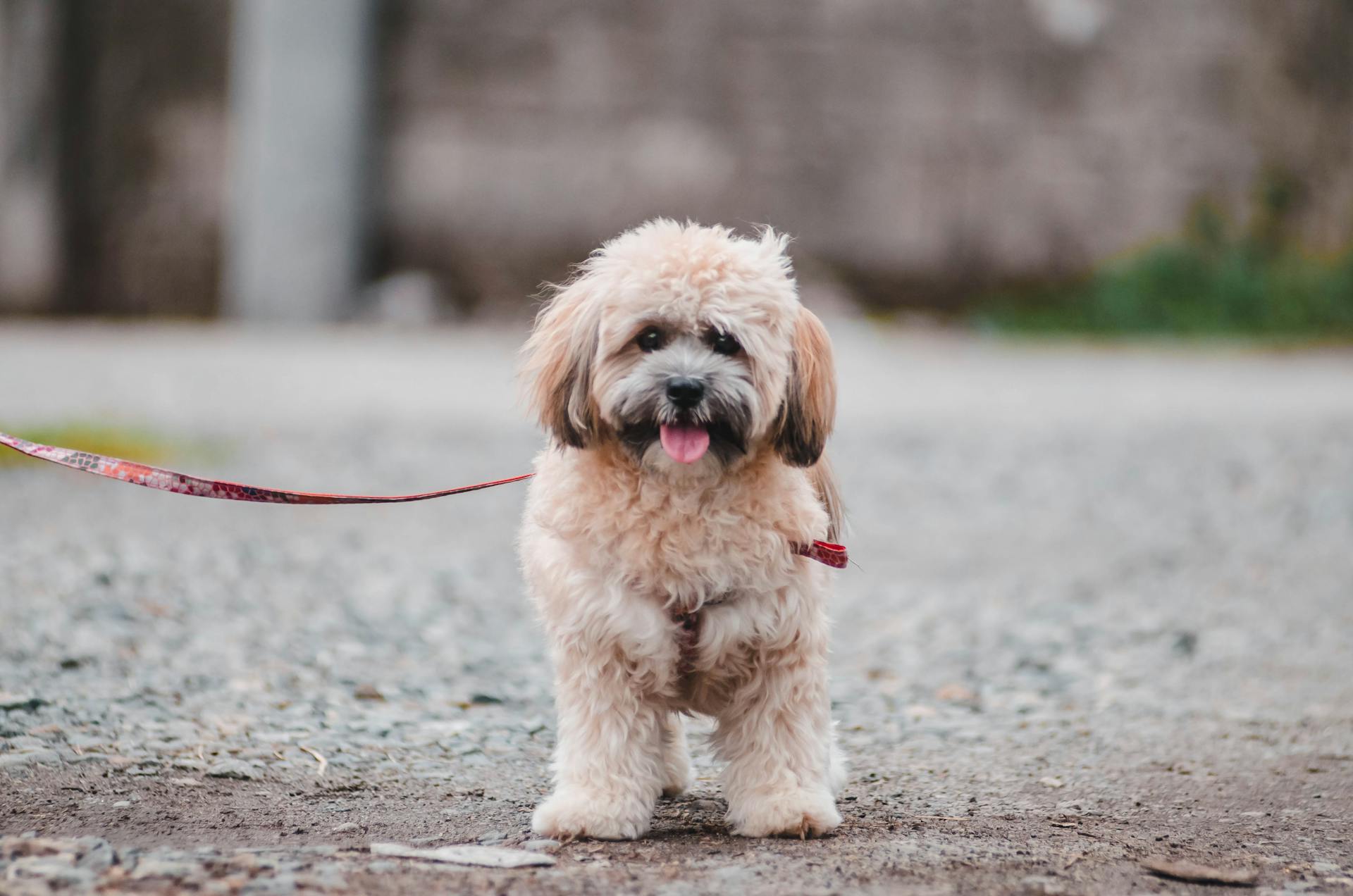
The Lhasa Apso and Havanese are two popular breeds that have captured the hearts of many dog owners. Both breeds have a long history of companionship and loyalty.
The Lhasa Apso originated in Tibet over 1,000 years ago, where they served as temple guards and companions to royalty. They were highly valued for their intelligence, courage, and gentle nature.
The Havanese, on the other hand, has its roots in Cuba, where they were bred as lap dogs for the aristocracy. They were known for their playful, affectionate, and adaptable personalities.
In terms of size, the Lhasa Apso typically weighs between 13-18 pounds and stands between 10-11 inches tall, while the Havanese weighs between 7-13 pounds and stands between 8.5-11.5 inches tall.
Intriguing read: Havanese Cross Breeds
Price and Availability
The Havanese and Lhasa Apso are both popular breeds, but their prices and availability can vary significantly.
The Havanese is generally more expensive, with prices ranging from $900 to $1200. In contrast, the Lhasa Apso is relatively more affordable, priced between $500 and $700.
Both breeds are quite easy to get, with frequent availability. You can easily find a Havanese or Lhasa Apso breeder or rescue organization.
Here's a quick comparison of the two breeds' prices and availability:
Health and Wellbeing
Both Lhasa Apsos and Havanese are generally hardy dogs, but they do have some breed-specific health issues to watch out for.
Lhasa Apsos tend to have more frequent health issues than other breeds, with a list of potential problems including Patellar Luxation, Allergies, Progressive retinal atrophy (PRA), and more.
The Havanese is a healthy breed, but there are certain health issues that you should check with your vet regularly, such as Cataracts, Heart Murmurs, and Hip Dysplasia.
Regular veterinary visits are crucial for both breeds, with Lhasa Apsos needing a complete physical check-up at least once (but preferably twice) per year, and Havanese needing a check-up at least once per year.
Here's a comparison of some common health issues in Lhasa Apsos and Havanese:
Both breeds can tolerate warm and cold weather, thanks to their double coat of fur.
Lhasa Apsos have an average lifespan of 13 years, while Havanese have an average lifespan of 15 years, making the Havanese a slightly longer-lived breed.
It's essential to note that both breeds can be prone to certain health issues, and regular veterinary check-ups can help identify potential problems early on.
Curious to learn more? Check out: What Is the Lifespan of a Havanese Dog
Training and Behavior
Both Lhasa Apos and Havanese dogs can be intelligent, but their training experience can differ. Lhasa Apos may exhibit a streak of independence, which requires patience and consistent positive reinforcement during training sessions.
Lhasa Apos are incredibly smart, but can be stubborn and have a reputation for being difficult to train. They do best with positive training techniques, as punishment sometimes results in aggression.
Havanese dogs are generally very sociable and adaptable, often enjoying the company of people and other pets alike. They tend to be easier to train, eager to please, and enjoy learning new tricks.
Here's a comparison of the two breeds' trainability and intelligence:
Both breeds thrive on mental stimulation, and without it, they can become bored and possibly mischievous.
Training and Socialization
Training and Socialization are key for a well-adjusted pet. Both Lhasa Apso and Havanese dogs have their quirks, but understanding their specific needs can lead to a harmonious relationship.
Lhasa Apsos are incredibly smart but can be stubborn and have a reputation for being difficult to train. Good early training and socialization are essential, and puppies can start learning the basics as early as 8 weeks old.
Positive training techniques work best for Lhasa Apsos, as punishment can result in aggression. They might need more repetition and firm guidance during training sessions.
Havanese dogs, on the other hand, tend to be easier to train, eager to please, and enjoy learning new tricks. They often respond well to patience and positivity, and are quick learners.
Both breeds thrive on mental stimulation, and without it, they can become bored and possibly mischievous. Havanese dogs are generally very sociable and adaptable, often enjoying the company of people and other pets alike.
Here's a comparison of the two breeds' social behaviors and adaptability:
Havanese dogs fit well in various household dynamics, including those with children. They are adorable with kids and usually excel in social settings.
Energy and Activity
When considering a new furry friend, it's essential to understand their energy and activity level. Lhasa Apso dogs have a higher energy level than other dog breeds, requiring regular exercise and mental stimulation.
The Havanese breed, on the other hand, has an average energy level, making them a great choice for those who live a semi-active life. They still need some exercise, but it's not as demanding as some other breeds.
Shih Tzu dogs have a lower energy level than other dogs, which means they don't require as much exercise or physical activity. However, they still need regular walks and playtime to stay happy and healthy.
It's worth noting that Lhasa Apso dogs have a minimal exercise need, while Havanese dogs have a very minimal exercise need. Shih Tzu dogs also have a minimal exercise need, making them a great choice for apartment living.
Here's a quick comparison of the energy levels and exercise needs of these breeds:
Remember, every dog is unique, and their energy and activity level can vary depending on their individual personality and needs. By understanding their requirements, you can provide the best possible care and attention for your furry friend.
Care and Grooming
The Havanese and Lhasa Apso breeds require attentive grooming to stay happy and healthy. Both breeds have unique coat types that need regular maintenance.
The Havanese has a soft, wavy, woolly, flat, and long coat that requires average grooming effort. This means they need to be brushed regularly to prevent matting and tangling.
In contrast, the Lhasa Apso has a dense coat that requires professional grooming to keep in good condition. This means they need regular trimming and clipping to prevent overgrowth.
Here's a comparison of the two breeds' grooming needs:
The Havanese sheds very little, with some owners reporting no shedding at all. This makes them a great choice for people with allergies. The Lhasa Apso, on the other hand, sheds above average, so they may not be the best choice for those with allergies.
Both breeds require regular bathing to stay clean and healthy. The Havanese needs to be bathed every 3-4 weeks, while the Lhasa Apso needs to be bathed every 4-6 weeks.
A unique perspective: Havanese and Allergies
In terms of stinkiness, the Havanese has a low chance of bad smell, while the Lhasa Apso has an average chance. This means the Havanese may be a better choice for those who live in small spaces or have limited ventilation.
Overall, both breeds require attention to their grooming needs to stay happy and healthy.
Physical Characteristics
Both the Havanese and Lhasa Apso are small in size, making them perfect companions for city living.
Their manageable sizes also make them relatively easy to care for, requiring less space and exercise than larger breeds.
Their endearing looks are a big part of their appeal, and it's easy to see why they're both so popular as pets.
The Havanese has a long, abundant coat that's either wavy or curly, and it requires regular grooming to prevent matting.
The Lhasa Apso, on the other hand, has straight, heavy hair that also demands regular grooming.
Both breeds have a wide range of colors to choose from, including cream, black, gold, smoke, and parti-color.
A unique perspective: Are Havanese Easy to Train
Temperament
Both Lhasa Apsos and Havanese dogs are known for their playful personalities. They're intelligent and curious, which makes them entertaining to be around.
Lhasa Apsos, in particular, tend to keep their puppy behaviors longer than other breeds, so be prepared for a longer "puppy phase." They're also stubborn, so consistent training is a must to keep them well-behaved.
One thing to keep in mind is that Lhasa Apsos suffer from separation anxiety when left alone for long periods. They thrive on being around their owners, so if you're away from home for extended periods, this might be a breed to consider carefully.
On the other hand, Havanese dogs are a bit more social and need a lot of interaction. They're highly responsive and affectionate, making them great family pets.
Here's a comparison of the two breeds' temperaments:
In terms of sensitivity, Lhasa Apsos are more sensitive than Havanese dogs, which means they don't like irregular daily routines or noisy households.
Bite and Safety

The Havanese and Lhasa Apso are both known for their gentle nature, but it's still essential to consider their bite characteristics and safety.
Both breeds have a weak bite force, ranging between 100 and 200 PSI, which is relatively low compared to other dog breeds.
Their biting potential is also low, meaning they have a low chance of biting somebody.
However, both breeds do have an average tendency to nip, chew, playbite, or herd people, so it's essential to socialize them properly and teach them good manners.
In terms of mouthiness, the Havanese and Lhasa Apso are quite similar, with both breeds having an average tendency to nip, chew, playbite, or herd people.
Here's a quick comparison of the two breeds' bite characteristics:
Ultimately, both breeds are suitable for families with children and are known for their friendly and outgoing personalities, making them a great choice for many dog owners.
Lifestyle and Adaptability
Lhasa Apsos and Havanese dogs are both adaptable breeds that can thrive in various living environments. They are both suitable for apartment living due to their small size.
However, Lhasa Apsos may prefer a calmer environment and can be reserved around strangers or new situations. In contrast, Havanese dogs are generally very sociable and adaptable, often enjoying the company of people and other pets alike.
Here are some key differences in their adaptability:
- Lhasa Apso: May prefer a calmer environment; can be reserved
- Havanese: Usually excels in social settings; adorable with kids
Both breeds are prone to separation anxiety when left alone, but Lhasa Apsos can adapt very well to lifestyle changes and basically all living environments.
Adaptability and Independence
Both Lhasa Apsos and Havanese dogs are highly adaptable to lifestyle changes and living environments. They can thrive in various household dynamics, including those with children.
Lhasa Apsos may prefer a calmer environment and can be reserved around new people and situations. In contrast, Havanese dogs usually excel in social settings and are adorable with kids.
Lhasa Apsos adapt very well to lifestyle changes, but they can be prone to panic, cry, bark, and whine when left alone by their owner. Havanese dogs tend to have separation anxiety when their owners leave them alone at home.

Here's a comparison of the breeds' adaptability and independence:
Both breeds require regular grooming due to their long coats, but Lhasa Apsos may be easier to groom than Havanese dogs. Havanese dogs are incredibly easy to train, as they're very people-oriented, while Lhasa Apsos can be stubborn, making training a bit more challenging.
Lhasa Apsos are suitable for someone who is often out, as they're more independent and assertive. In contrast, Havanese dogs do best in homes where they only have to stay by themselves for short periods.
Return
As you're considering bringing a new furry friend into your life, it's essential to think about your lifestyle and how it will impact your dog's adaptability. Both Havanese and Lhasa Apso breeds are suitable for apartment living due to their small stature.
They require regular grooming, which can be a commitment, but it's a great opportunity to bond with your dog. Both breeds have a moderate energy level, needing regular but not excessive activity to stay happy and healthy.

Havanese dogs are known for their gentle and affectionate nature, making them an excellent pet for homes with children and other animals. They need a lot of social interaction, so if you're always on the go, this might not be the best breed for you.
Lhasa Apso dogs, on the other hand, are more independent and assertive, suitable for someone who is often out. They have a protective instinct, making great watchdogs, but they can be wary of strangers.
Here's a comparison of their social needs:
Both breeds are generally long-lived, but regular veterinary check-ups are crucial to monitor their well-being. If you're looking for a breed that's low maintenance in terms of exercise, Lhasa Apso might be a better fit.
Frequently Asked Questions
What are the cons of Lhasa Apso?
Lhasa Apsos are generally a healthy breed, but they can be prone to kidney issues such as glomerular disease and renal dysplasia, which can lead to chronic kidney disease
Sources
Featured Images: pexels.com
